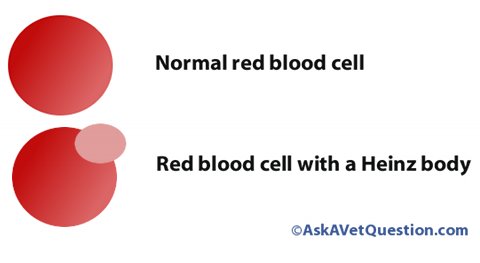Latest posts from Dr. Marie's blog...
Propylene Glycol and Cats
If you find this information useful, please spread the word by sharing this on Facebook with your friends or Tweeting this article.
Click here to Follow Dr. Marie on Twitter or here to Become a Facebook Fan.
Proplyene Glycol is an additive that is present in many dog foods to help with moisture content. In dog food it is an acceptable ingredient that the FDA considers as "generally safe". If propylene glycol was present in high levels in dog food it could be toxic, however.
Propylene Glycol is used in food to accomplish several things:
- To absorb extra water and help keep food moist.
- As a solvent for colors and flavors in the food.
Why is propylene glycol not used in cat food?
While dogs and humans can tolerate small amounts of propylene glycol in their diet, cats cannot. Cats are extremely sensitive to this chemical!
Small amounts of propylene glycol ingestion in cats can cause something called Heinz body anemia. This is the same type of problem that happens when a cat ingests too much onion or garlic. Here is a simple view of what a Heinz body is:

The extra little dot on the red blood cell membrane is a clump of protein. We are not exactly sure why Heinz bodies on red blood cells cause anemia1. But, it is believed that a red blood cell containing Heinz bodies is much more fragile than a regular red blood cell and therefore, can be easily destroyed within the body.
As more and more toxin is absorbed, the body makes more abnormal red blood cells. If too many red blood cells get destroyed, then the result is anemia, which means that the red blood cell level is too low. If anemia gets severe enough it can be life threatening.
A study2 done in 1992 found that the more propylene glycol that is in a cat's food, the more red blood cell damage there is.
As a result, in 1996, guidelines were changed so that no propylene glycol at all was allowed in cat food3.Related
Chicken Jerky problems in dogs: Some brands of chicken jerky were found to have undeclared propylene glycol.VitaKitty Recall because of propylene glycol in cat food.
In most cases, once the toxin (i.e. propylene glycol) is removed from the pet's diet, then the body can start to make new, healthy red blood cells again and the pet can return to a completely healthy state.
References
1. Erythrocyte pathology and mechanisms of Heinz body-mediated hemolysis in cats.
2. Hematological alterations in kittens induced by 6 and 12% dietary propylene glycol.
3. FDA - Pet Food labels - general.
Popular questions...
arthritis in 17 year old dog I have a 17 year old female german shepard/black lab/collie mix that weighs 45... (96244 views)
Orange urine in a dog. I have had Moe for two years. He is 17 years old now according to the vet. He... (10766 views)
Training blind dog. My rottweiler is blind and does not like to go outside. If I put her on a leash and... (13289 views)
Bloated abdomen in hamster. Hi....our pet hamster buddy is extremely bloated. We have had him for a year and a... (108627 views)
Short of breath and runny nose. My dog is shor of breath, has a runny nose, and is shaking please help me I do not... (9982 views)
Vomiting undigested food. My cat primarily eats dry food. She frequently vomits undigested food.What can I do... (16263 views)
Time to put to sleep? I adopted my cat about 1.5yrs ago. When I adopted her I was told she was 3 yrs old;... (18216 views)
Recurring respiratory symptoms. My 1 yr old Burmese cat was purchased with what we think is cat flu. She has... (15125 views)
Milky urine in guinea pig. One of my guinea pigs urine is milky, this has never happened before. Their diet is... (13943 views)
Lump near nipple. She has a lump(i think so).. It's hard, and about a marble's size in... (12982 views)
See all questions... Dr. Marie is a veterinarian who practices in a busy animal hospital in Ottawa, Ontario. She created Ask A Vet Question as a resource for good, accurate veterinary advice online. Dr. Marie treats dogs, cats, hamsters, guinea pigs, and rats. She has been a vet since 1999.
Dr. Marie is a veterinarian who practices in a busy animal hospital in Ottawa, Ontario. She created Ask A Vet Question as a resource for good, accurate veterinary advice online. Dr. Marie treats dogs, cats, hamsters, guinea pigs, and rats. She has been a vet since 1999.
Is an online vet visit just as good as a trip to your veterinarian? No! But, many times, asking an online veterinarian a question can help save you money. While Dr. Marie can't officially diagnose your pet or prescribe medications, she can often advise you on whether a vet visit is necessary. You can also ask Dr. Marie for a second opinion on your pet's condition.













